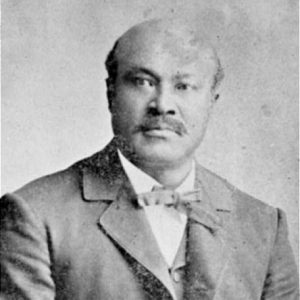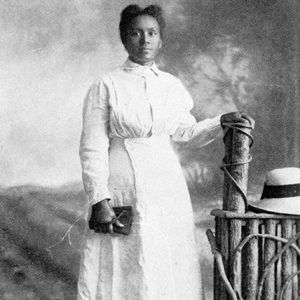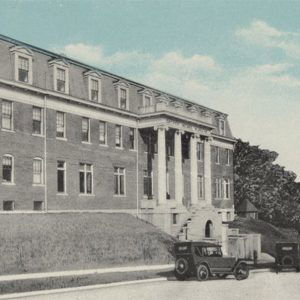calsfoundation@cals.org
Eliza Ann Ross Miller (1869–1938)
Eliza Ann Ross Miller was an African American businesswoman and educator, as well as the first woman to build and operate a movie theater in Arkansas. She was the wife of prosperous Helena (Phillips County) businessman, state legislator, and church leader Abraham Hugo Miller. After her husband’s death, she continued his business operations while also providing leadership in the Helena school system. She was inducted into the Arkansas Black Hall of Fame in 1999.
Eliza Ross was born in Arkadelphia (Clark County) on September 6, 1869, to George and Sarah Ross. On June 15, 1887, she married Abraham H. Miller in Arkadelphia. The couple had eight children, five of whom survived into adulthood. Abraham Miller, who had been successful in real estate and other ventures, noted that his wife was a “fair and handsome” woman, but what he valued most about her was her business sense. He praised her abilities as a “collector, supervisor secretary, bookkeeper and general manager for the past seven years. Instead of business failing or dropping back under her administration, it has gone steadily forward.”
After Abraham’s death in 1913, Eliza Miller built the Plaza Theatre, which opened around 1917 at 116 Walnut Street in downtown Helena. By 1918, audiences at the Plaza could view silent films by Charlie Chaplin, Norma Talmadge, and Jackie Saunders, which Miller obtained from distributors in Dallas, Texas, and Memphis, Tennessee. In 1921, the Plaza showed a film starring Black actor Sidney P. Dones with an “all Colored Star cast.” By the 1920s, Miller’s son Lucian, a graduate of Fisk University and Arkansas Baptist College, was living with her and running the Plaza. By the 1930s, Eliza Miller was again in charge of the theater, which she operated until her death.
In addition to running the family’s businesses, Miller was also active in education. With her husband, she served on the board of trustees at Arkansas Baptist College in Little Rock (Pulaski County). In the mid-1920s, she bought land that belonged to Sacred Heart Academy, which was run by the Sisters of Charity. In 1926, Eliza Miller High School, the first African American high school in the area, was established at the site. In later years, the Eliza Miller Award was given to the best teachers at the school.
Eliza Miller died on August 28, 1938. She is buried in Magnolia Cemetery in Helena.
In 1970, Eliza Miller High School was desegregated and renamed Eliza Miller Junior High School. Over the years, in addition to instructing Helena children, the school hosted such musical acts as the Staple Sisters and B. B. King. In 1978, Eliza Miller Park was established in Helena. Three schools in the area now bear her name: Eliza Miller Junior and Senior High School, Eliza Miller Elementary School, and Eliza Miller Primary School. Combined, the schools number roughly 1,000 students, more than ninety percent of whom are African American. The schools are located at 106 Miller Loop in Helena-West Helena. Eliza Miller Junior and Senior High School was placed on the National Register of Historic Places in December 2023.
In 2003, the Arkansas General Assembly recognized Eliza Miller and the Miller family for their accomplishments in its House Concurrent Resolution 1028: “Recognizing and Commending the Miller Family.” The resolution, sponsored by Helena’s state representative, Barbara King, noted: “Eliza Miller’s legacy to her family and today’s black youth is the value of an education, determination, and respect.” That same year, New York Institute of Technology student and filmmaker Dana Bingham completed a short documentary film, Eliza Ross Miller: Ye Shall Know Thee by Thy Fruits, which was funded by the Arkansas Humanities Council. According to Bingham, whose parents and grandparents attended Eliza Miller High School, the film examined how the school “went against every stereotype of education in the segregated South.”
Miller’s descendants have gone on to become successful lawyers and business owners. Her grandson George Miller Jr. opened a movie theater in Memphis in 1974 and founded Miller Memphis, Inc., which had large holdings on Beale Street. Another grandson, Dr. Robert Dan Miller, became the first Black board president of the Arkansas Board of Health, the first Black doctor at Helena Hospital, and the first Black mayor of Helena. Dr. Miller’s son, Brian Miller, was appointed a federal judge.
For additional information:
Abraham H. Miller Papers. Center for Arkansas History and Culture. University of Arkansas at Little Rock, Little Rock, Arkansas.
“Eliza Miller Junior and Senior High School.” National Register of Historic Places registration form. On file at Arkansas Historic Preservation Program, Little Rock, Arkansas. Online at https://www.arkansasheritage.com/arkansas-preservation/properties/national-registry (accessed May 22, 2024).
“Filmmaker Earns Accolades for Documentary.” Newswise. http://www.newswise.com/articles/filmmaker-earns-accolades-for-documentary (accessed May 22, 2024).
Miller, Abraham H. How I Succeeded in My Business. N.p.: 1911.
Robinson, Charles F., and Lonnie Williams. Remembrances in Black: Personal Perspectives of the African American Experience at the University of Arkansas, 1940s–2000s. Fayetteville: University of Arkansas Press, 2010.
Smith, C. Calvin, ed. Educating the Masses: The Unfolding of Black School Administrators in Arkansas, 1900–2000. Fayetteville: University of Arkansas Press, 2003.
Colin Woodward
Lee Family Digital Archive, Stratford Hall











The second school named for Eliza Miller, Eliza Miller Junior and Senior High School, was built after a lawsuit filed by civil rights attorney W. Harold Flowers. This suit was filed on behalf of the Phillips County NAACP and other African Americans in the area who wanted a more modern school like the white Helena school, Central. They were asking for the facilities to be equalized (e.g., a new gym, cafeteria services, and equal pay for teachers) and additional services for the students. A bond was passed resulting in funds to build the new school, which opened in September 1954. On December 6, 2023, this school was listed on the National Register of Historic Places under Criterion A: Education and Ethnic Heritage: Black with local significance. Sources: Department of Arkansas Heritage, Nomination Document, and interviews with alumni.